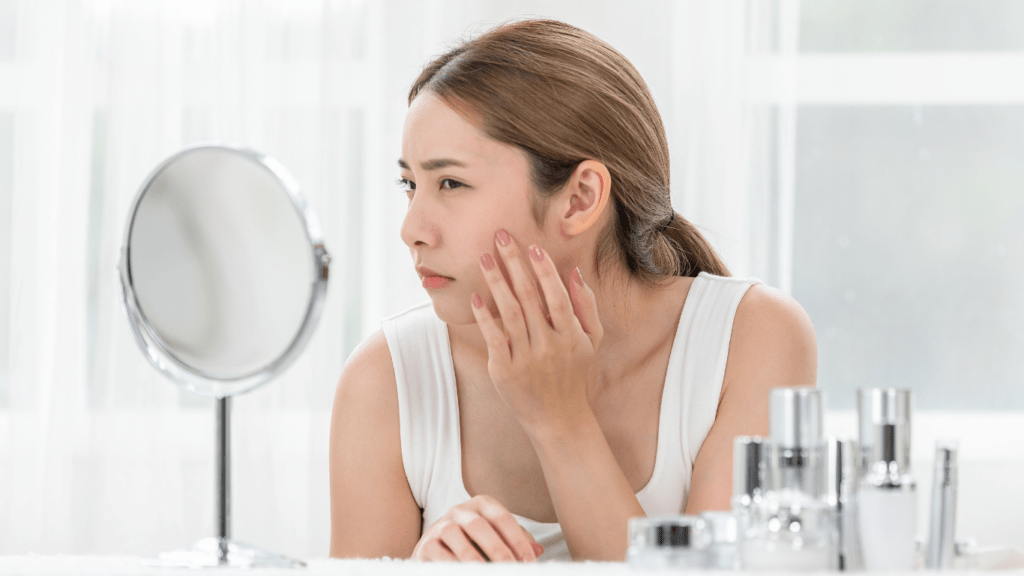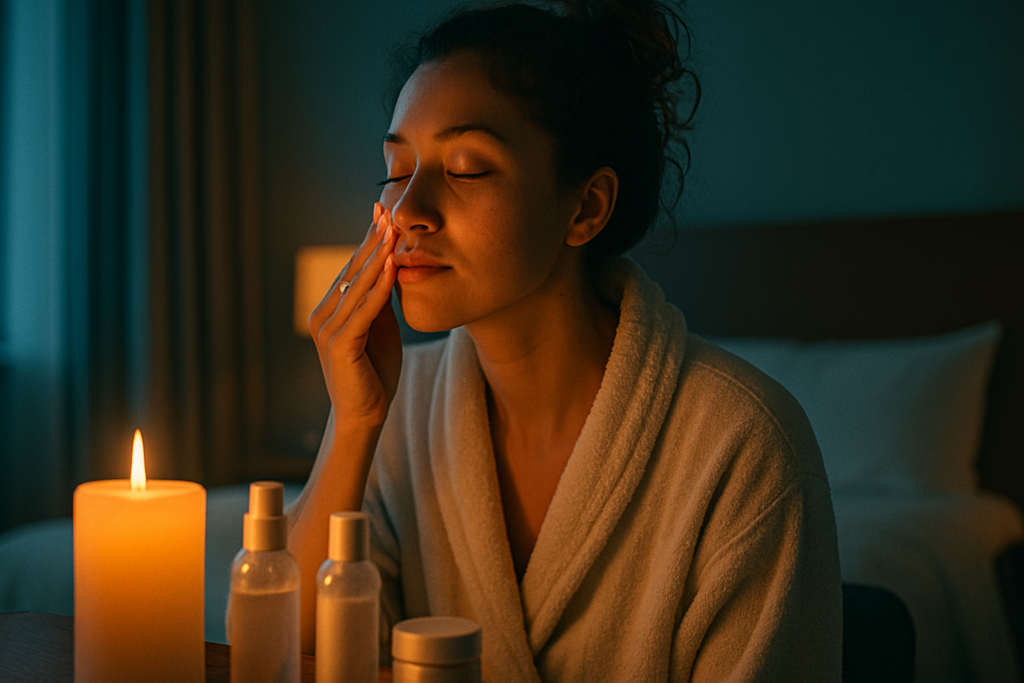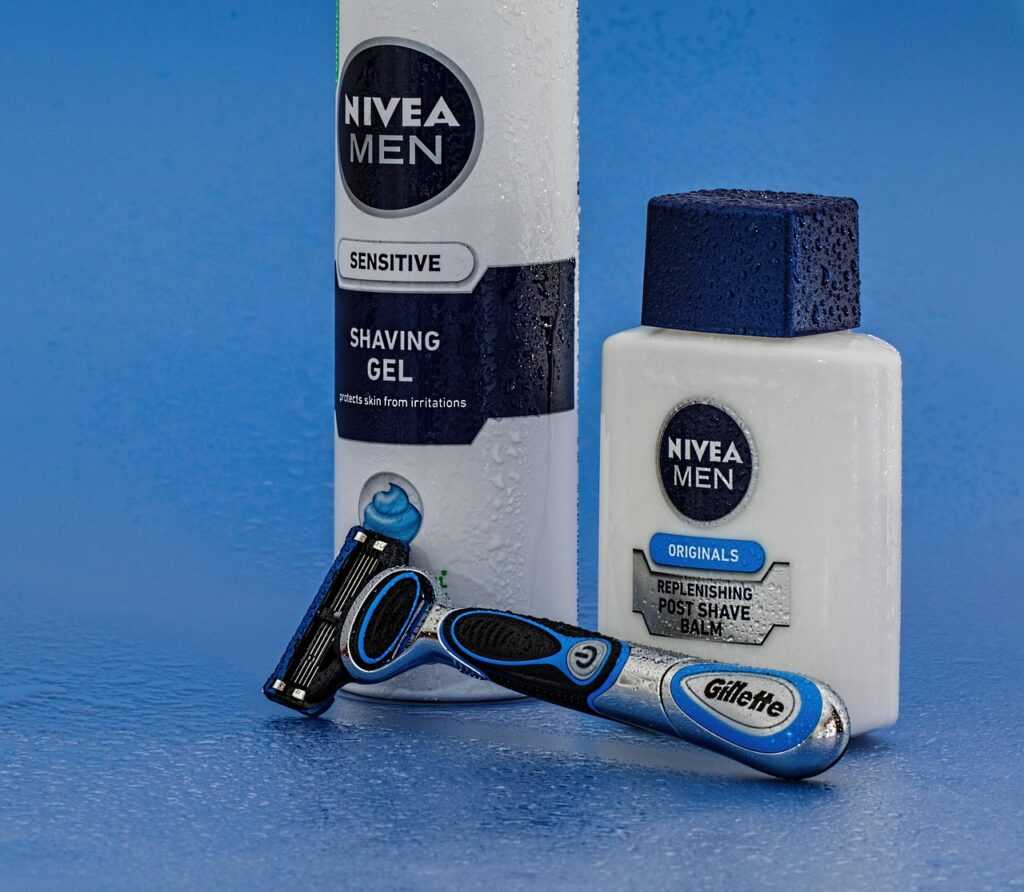Understanding Your Skin Type
Knowing your skin type is crucial for selecting the right products and routines. Skin can generally be classified into five types: normal, oily, dry, combination, and sensitive.
Normal Skin
Normal skin has a balanced oil and moisture level. It’s not too oily or dry. People with normal skin rarely experience blemishes and typically have a smooth texture.
Oily Skin
Oily skin produces excess sebum, leading to a shiny appearance. Frequent breakouts and enlarged pores are common. Using non-comedogenic products helps manage oiliness.
Dry Skin
Dry skin lacks sufficient moisture. It’s often flaky, rough, and can feel tight. Hydrating products and avoiding harsh cleansers are key for dry skin care.
Combination Skin
Combination skin displays characteristics of both dry and oily skin. The T-zone (forehead, nose, and chin) is typically oily, while other areas are dry. Balancing products are essential.
Sensitive Skin
Sensitive skin is prone to redness and irritation. External factors like skincare products and environmental conditions can trigger reactions. Gentle, hypoallergenic products are recommended.
Understanding your skin type is the first step toward achieving glowing skin year-round.
Essential Skin Care Routine

Maintaining a glowing complexion requires a consistent and effective skincare routine. For optimal results, focus on cleansing, exfoliation, and moisturizing.
Cleansing
Start by using a gentle cleanser suited for your skin type. Aim for twice-daily cleansing to remove impurities, makeup, and excess oil. For oily skin, consider foaming cleansers that control sebum. For dry or sensitive skin, opt for hydrating or cream-based cleansers which nourish and soothe.
Exfoliation
Exfoliate your skin two to three times per week to slough off dead skin cells and unclog pores. Use chemical exfoliants like AHAs (alpha hydroxy acids) or BHAs (beta hydroxy acids) for deeper penetration. Physical scrubs are beneficial for quick results; however, they should be gentle to avoid irritation, especially on sensitive skin.
Moisturizing
Hydrate your skin daily with a moisturizer appropriate for your skin type. For dry skin, choose rich, creamy moisturizers containing ingredients like hyaluronic acid and ceramides to lock in moisture. For oily skin, use lightweight, oil-free formulations. Always apply moisturizer while your skin is slightly damp to maximize absorption and lock in hydration.
Diet And Hydration
Maintaining a balanced diet and staying hydrated are crucial for glowing skin. Nutrient-rich foods and sufficient water intake help improve skin health.
Foods For Healthy Skin
Certain foods contribute significantly to healthy skin. Antioxidant-rich fruits like berries, and Vitamin C-packed citrus fruits, help fight free radicals. Vegetables like spinach and kale provide essential vitamins and minerals. Omega-3 fatty acids in fish like salmon and nuts support supple skin. Incorporate these foods into daily meals to see noticeable differences.
Importance Of Hydration
Hydration plays a key role in skin’s appearance. Water helps detoxify the skin and maintain its elasticity. Drink at least eight glasses of water daily to keep skin hydrated. If living in a dry climate or active physically, increase water intake accordingly. Herb-infused teas and water-rich foods like cucumbers and watermelon also aid hydration efforts.
Protecting Your Skin From The Sun
Sun protection’s critical for maintaining glowing skin year-round. Exposure to UV rays can lead to premature aging, sunburn, and increased risk of skin cancer.
Choosing The Right Sunscreen
Selecting the right sunscreen is essential for effective sun protection. Look for a broad-spectrum sunscreen that offers protection against both UVA and UVB rays. Make sure the SPF (Sun Protection Factor) is at least 30, as this level blocks approximately 97% of UVB radiation. For sensitive skin, opt for mineral-based sunscreens containing zinc oxide or titanium dioxide; these ingredients are less likely to cause irritation. Always check the product’s water resistance, especially if you’ll be swimming or sweating. Remember to apply sunscreen 15 minutes before heading outside to ensure it forms a protective layer on the skin.
Daily Sun Protection Habits
Incorporating sun protection into your daily routine can significantly reduce skin damage risks. Wear sunscreen every day, even on cloudy days, as UV rays can penetrate clouds. Reapply every two hours or immediately after swimming or sweating. Use protective clothing, like long-sleeved shirts, wide-brimmed hats, and sunglasses with UV protection to cover exposed skin areas. Seek shade during peak sun hours, typically from 10 AM to 4 PM, to minimize direct UV exposure. Consider using makeup and moisturizers that contain added SPF for extra protection, integrating sun safety effortlessly into your skincare regimen.
Natural Remedies For Glowing Skin
Natural remedies offer safe and effective ways to enhance your skin’s radiance.
DIY Face Masks
Creating DIY face masks at home is a cost-effective method for nourishing the skin. Ingredients like honey, avocado, and yogurt contain beneficial properties.
- Honey and Yogurt Mask: Mix 2 tablespoons of yogurt with 1 tablespoon of honey. Apply to the face for 15 minutes to moisturize and soothe.
- Avocado and Oatmeal Mask: Mash half an avocado and mix with 1/4 cup of oatmeal. Apply for 10-15 minutes to exfoliate and hydrate.
- Banana and Lemon Mask: Blend one banana with a few drops of lemon juice. Leave it on for 15 minutes to brighten and rejuvenate the skin.
Essential Oils And Their Benefits
Essential oils can promote glowing skin when used properly. Some oils contain anti-inflammatory and antioxidant properties.
- Lavender Oil: Helps reduce acne and soothe irritated skin. Mix a few drops with a carrier oil and apply to affected areas.
- Rosehip Oil: Rich in vitamins A and C, it aids skin regeneration and improves texture. Apply a few drops nightly.
- Tea Tree Oil: Known for its antimicrobial properties, it helps clear acne. Dilute with a carrier oil before applying to the skin.
- Jojoba Oil: Balances oil production and provides hydration. Use as a moisturizer both morning and night.
Using these natural remedies can significantly contribute to maintaining glowing skin all year round.
Lifestyle Changes For Better Skin
Maintaining glowing skin isn’t just about skincare products but lifestyle changes too. Adjusting daily habits can significantly impact skin health and appearance.
Sleep And Stress Management
Good sleep is crucial for skin regeneration. During deep sleep stages, the body repairs itself, helping maintain a youthful appearance. Lack of sleep causes dull skin, under-eye circles, and worsens existing skin conditions. Aim for 7-9 hours of quality sleep per night.
Stress directly affects skin health. High stress levels trigger hormone production, leading to oily skin and acne. Manage stress through mindfulness, meditation, or hobbies you enjoy. These activities keep stress hormones in check, promoting clearer, healthier skin.
Exercise And Its Impact On Skin
Regular exercise improves blood circulation, enhancing skin tone and texture. Exercise delivers oxygen and nutrients to skin cells, keeping them healthy. A minimum of 150 minutes of moderate activity weekly is recommended.
Sweating during workouts helps flush out toxins. Post-exercise, it’s important to cleanse the skin to remove sweat, oil, and impurities. This practice prevents breakouts and keeps the skin fresh.




